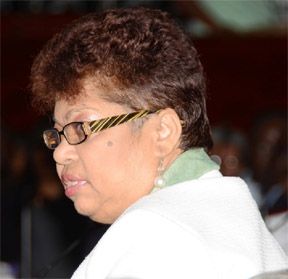Declaring that “the education system in Guyana sucks,” APNU MP Amna Ally on Monday suggested that the $3 billon proposed for injection into the sector for this year will not make much difference unless government rethinks its approach.
During her presentation on this year’s proposed budget, Ally also told the National Assembly that the main opposition APNU is against any consideration by the government to raise tuition fees at the University of Guyana (UG).
“Every citizen has the right to an education from the nursery to tertiary level, not being denied because of their financial situation,” she said.
Ally noted the $1.7 billion subvention intended for UG and said that this investment, though substantial, will not address the university’s financial woes, especially since several of its deficiencies have not been tackled. She said that more than $400 million of the funds will be used to facilitate the student loan system, but pointed out that more and more students are paying cash, which means that much of the funds will not be utilised.
In addition, she said that the government’s loan recovery procedure has not been addressed, even as the government continues to lose millions as a result of its lax posture in ensuring students repay their loans.
Ally, in general, bemoaned what she said was the government’s faulty approach to the development of Guyana’s education system as she she pointed out that it injected around $80 million into the sector after English and Math pass rates were found to be 31%. Instead of an improvement, however, she said pass rates fell to 29%, which clearly proved that the method of intervention adopted by the government was not the answer.
Ally said that government seems to be convinced that heavier investments into the sector will automatically bring improvement but called this an obvious misconception. Much of the $3 billion allocation proposed for this year will be going towards the improvement of infrastructure, such as repairs to old schools as well as the construction of new schools. Ally said that instead of attempting to construct schools, government should concentrate its resources on improving the resources, both infrastructural and human already in place.
Ally added that if government is indeed serious about improving the standard of education in Guyana, it must repair and properly equip the existing educational institutions, and improve the training and remuneration of teachers. “We have to get it right,” she said, while noting that the government continues to focus on quantity.
“We must not focus on how much but how good,” she added, arguing that the training of teachers in Guyana was deficient.
She said poor training of the nation’s educators translates into a poor education for students, which hampers the country’s development.
Though commending Education Minister Priya Manickchand on successes such as the improvement of the Learning Channel, Ally came down on the Ministry on the issue of teacher wages. Convinced that a better salary is key to the improvement of the education system, she said, “Our teachers cannot and will not give of their best if they are not properly remunerated.”
She said that with their current salaries teachers have been forced to take sub-jobs, especially to cope in a society where the cost of living is quite high.
Ally also chastised the government on attempting to improve test levels at the secondary levels, and their decision to make substantial investments at this level to achieve this goal.

She recommended that the funds be used at the primary level, owing to her conviction that if the foundation of the education level is solid, it will follow through to the secondary and tertiary levels.
Other problems cited by Ally included the lack of a good welfare department, and the prevalence of extra lessons. She said that if schools were doing what they are charged with, there would not be a need for so many extra classes.
Ally said that this combination of improving school facilities, developing teacher capacity, increasing salaries and the strengthening of the education system’s foundation would effectively improve the level of education in Guyana. She added that to encourage the students to work harder, the government should also consider introducing a merit system where incentives are given students who improve their performance.
She also said that the government continues to fall down on its treatment of Guyana’s Technical Voca-tional institutions. She said that the failure to make provisions for these institutions is causing Guyanese to miss out on many opportunities.
She noted that Guyanese have lost out on opportunities to work on several projects across the country, including the construction of the Marriott Hotel and the Cheddi Jagan International Airport Expansion because the education system is not geared towards helping them prepare for a career in these fields.
“Academics has taken precedence and as such the government is not giving students a rounded education,” she said.




